The battle to succeed Pope Francis is one for the very soul of the Catholic Church and its over a billion followers around the world.
Whoever becomes the 267th Pope will dictate the direction of the Church for the next decade or more on the most pressing, and contentious, issues facing society.
Pope Francis broke with the conservative stance of his two predecessors, John Paul II and Benedict XVI, and his papacy will be remembered for his liberalism on LGBTQ+ rights, his support for refugees, and his focus on climate change.
In recent years Francis has done a great deal to shape the makeup of the ancient and secretive group that will appoint his successor, with about 80 per cent of the 138 Cardinals eligible to vote having been appointed by him, meaning there is a good chance the next Pope will be somebody loyal to Francis who takes a liberal approach to the Papacy.
However this is far from certain as once the College of Cardinals convenes for the ‘highly political’ process known as the conclave, all bets could be off.
While it may come down to a battle between conservative and liberal factions, there is certainly no unified block and many of the Cardinals appointed by Francis come from a wide range of countries that have starkly different views on issues such as the role of women in the Church and attitudes towards gay Catholics. Relationships and personalities will also be at play.
This struggle between divergent factions with different opinions on issues such as LGBT+ rights and women will be familiar to anybody who has seen the award-winning film Conclave, starring actor Ralph Fiennes.
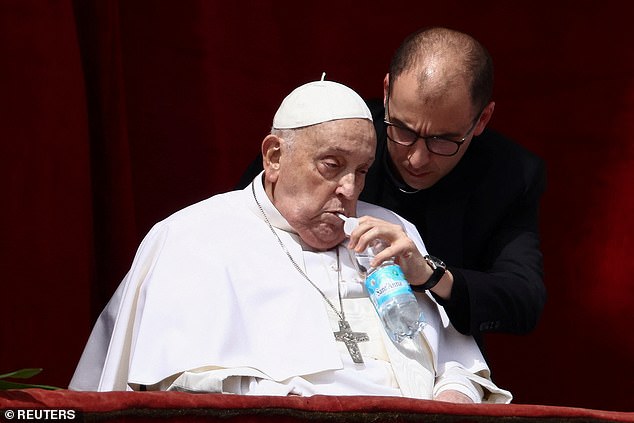
Pope Francis is given a drink as he appears on a balcony as the ‘Urbi et Orbi’ message was delivered at Saint Peter’s Square yesterday
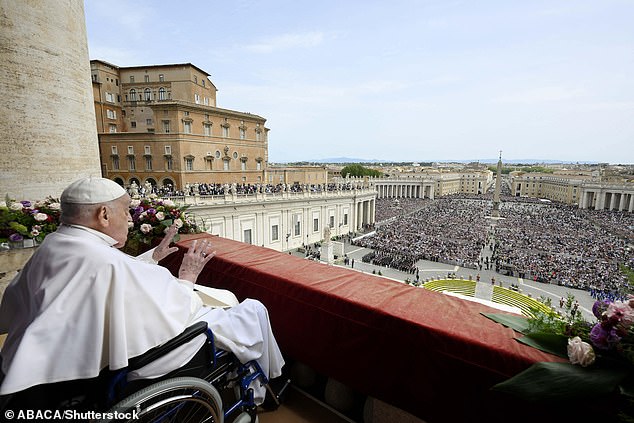
Pope Francis delivers his Easter message and blessing Urbi et Orbi – ‘To the City and the World’ – via an aide as he sits and watches from the balcony of Saint Peter’s basilica yesterday
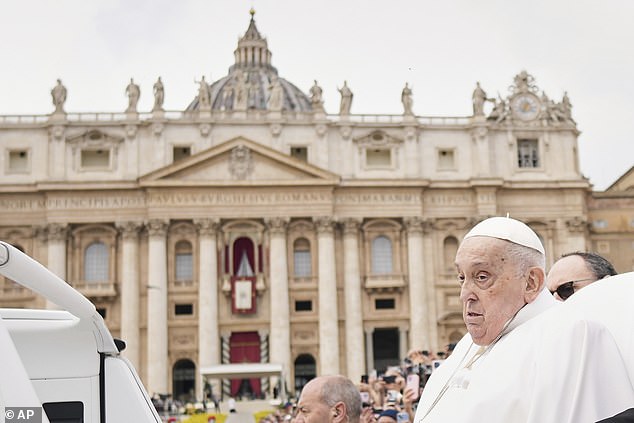
Pope Francis tours St. Peter’s Square in his popemobile after bestowing the Urbi et Orbi
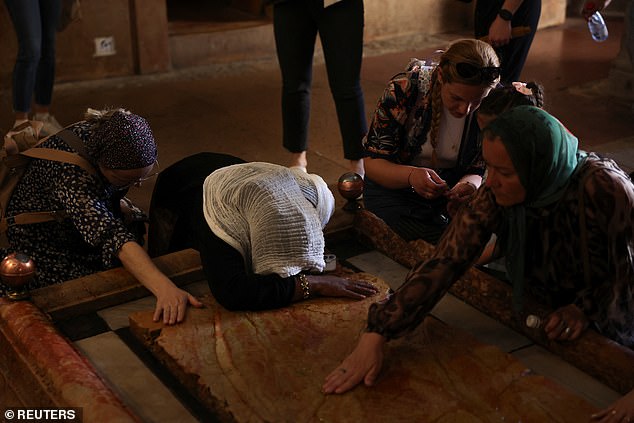
Worshippers gather by the Stone of Anointing, after the death of Pope Francis was announced, at the Church of the Holy Sepulchre in Jerusalem’s Old City, April 21, 2025
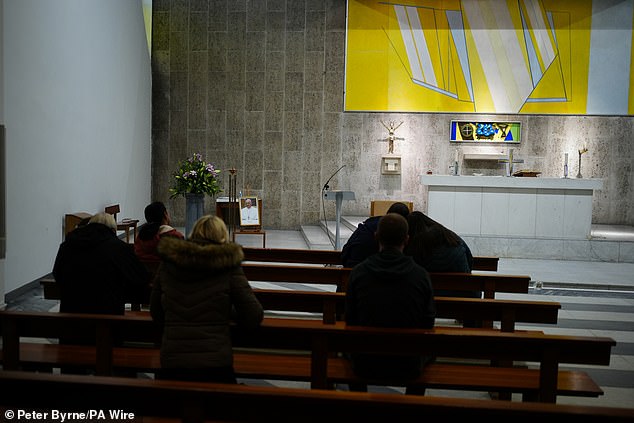
People pray at Liverpool Metropolitan Cathedral following the announcement
The conclave could return a conservative, such as Hungarian Cardinal Peter Erdo, whose ‘appointment would send a powerful message about the direction the Church would be taking’, according to the Catholic Herald.
It could be a more liberal Pope from the developing world, such as the Philippines’ Cardinal Luis Antonio Tagle, who would become the first Asian Pope in the history of the Church. Or it could be Ghana-born Cardinal Peter Turkson, who would become the first black Pope and would be celebrated by the millions of devout Catholics on the African continent.
Either appointment would be hailed by liberals given the changing demographic of the Church and would signify a move away from Europe where congregations in many countries, including the UK, have been dwindling while they have grown in others parts of the world.
Among the favourites is Italian Cardinal Pietro Parolin, the Vatican’s secretary of state, or highest-ranking diplomat. For 11 years he survived Francis’ ‘regular savage reshuffles’ and he is regarded as a moderate. His success would, perhaps, be seen as a continuation of the Franciscan priorities and reforms.
Whoever is to be elected the next Pope, what is certain is that the eyes of the world’s almost 1.5 billion Catholics will be fixed on the Vatican in the coming weeks as they wait for white smoke. Here are the top contenders to become the next Supreme Pontiff…
Peter Turkson, 76
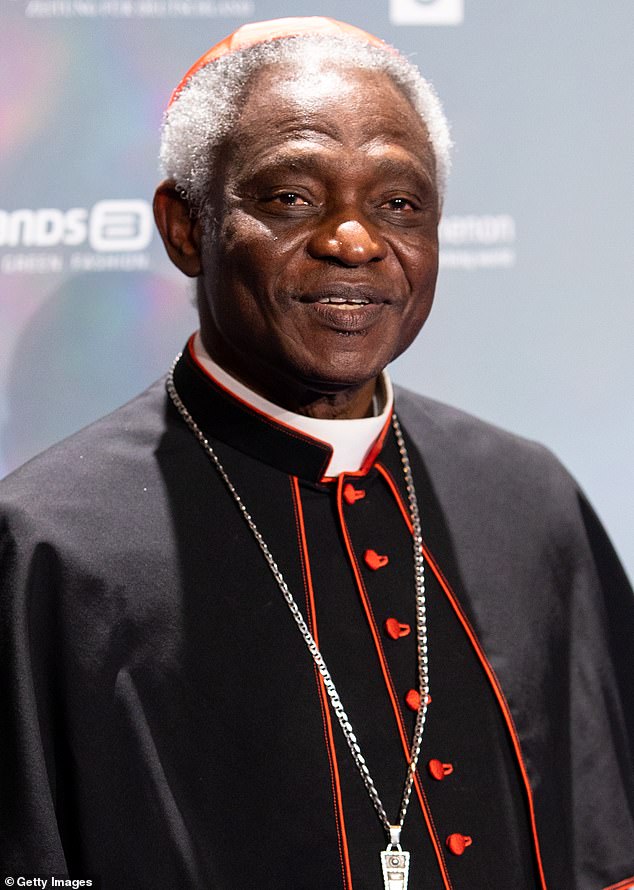
Cardinal Turkson, born in Ghana, was the bookies’ favourite at one point when Francis was chosen in 2013. He would be the first black pope
The former Bishop of the Cape Coast, would be the first black Pope and would have the appeal of reaching out to Africa.
Born in Ghana, he was sent by Pope Francis as a peace envoy to South Sudan.
He occupies the middle ground on the tricky subject of gay relationships, arguing that laws in many African countries are too harsh but that the views of Africans on the subject must be respected.
Turkson was the bookies’ favourite at one point during the 2013 conclave, when Francis was chosen.
But his views have previously sparked a firestorm of controversy after he laid the blame for clerical sex abuse crises at the feet of gay priests.
Speaking to an American journalist in February, 2013, he said that similar sex scandals would never happen in African churches as the culture on the continent was more geared up against homosexuality.
‘African traditional systems kind of protect or have protected its population against this tendency,’ he told Christiane Amanpour of CCN.
‘Because in several communities, in several cultures in Africa homosexuality or for that matter any affair between two sexes of the same kind, are not countenanced in our society,’ he continued.
‘So that cultural taboo, that tradition has been there,’ said Cardinal Turkson, 64. ‘It has served to keep it out.’
Luis Antonio Tagle, 67
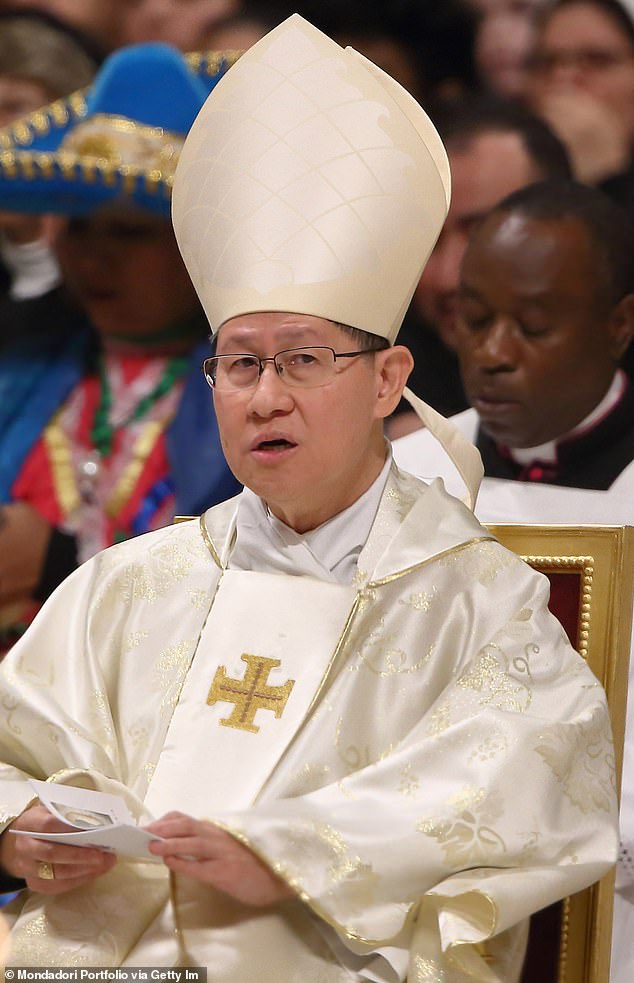
Tagle is a frontrunner this time round and is considered one of the more liberal candidates
Tagle, the former Archbishop of Manila, has emerged as the frontrunner in the betting markets.
He would have the appeal of being the first Asian Pope, the region with the fastest-growing Catholic population.
He has opposed abortion rights in the Philippines but would be considered one of the more liberal candidates.
He has complained that the Catholic church has been too harsh towards gay and divorced couples, and that this has hampered its evangelical work.
The Filipino religious leader is famed for being the ‘singing cardinal’, who uses Facebook to spread the work of the Lord.
As Asia’s most prominent Roman Catholic leaders, he sings on stage, preaches on TV and reduces church-goers to tears with his often light-hearted sermons.
With his down-to-earth, personable manner, Tagle, nicknamed ‘Chito’ by his adoring followers, seems a world apart from the conservative Cardinals and Bishops of Europe and North America.
Pietro Parolin, 70
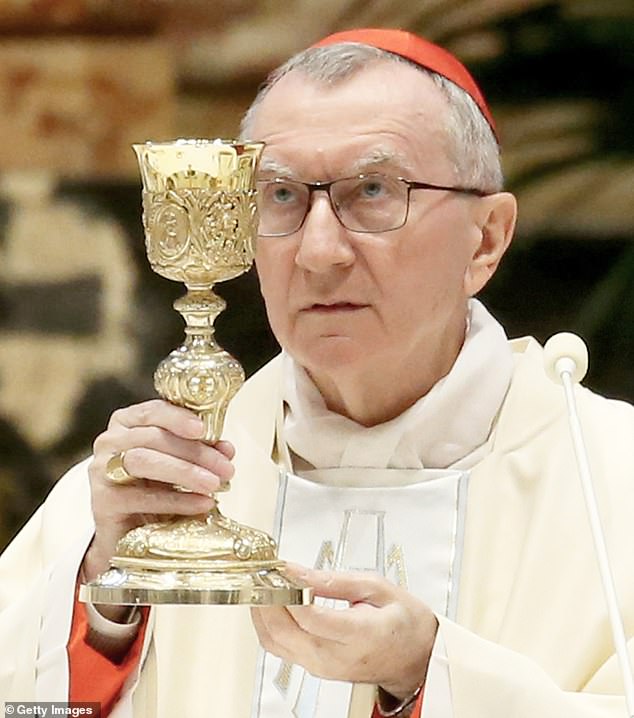
Parolin has worked closely with Pope Francis but has upset some with his views on China
He is the closest to a ‘continuity candidate’, having worked with Pope Francis as Cardinal Secretary of State.
He is seen as a moderate, though not as close to the liberal wing as Francis has sometimes appeared to be.
When Ireland voted in 2015 to legalise same sex marriage, Parolin described it as ‘a defeat for humanity’.
Following the landmark Irish referendum, he said: ‘Not a defeat for Christian principles, it was a defeat for humanity… I was very saddened by this result.’
Parolin added the referendum result showed the Church needed to improve the ways it preached the Christian message.
‘The Church must take account of this reality, but in the sense of reinforcing its commitment to evangelization,’ he said.
In recent times, Parolin’s star has fallen a little thanks to his being the architect of the 2018 agreement between the Holy See and China, which some regard as a sell-out to the Chinese Communist Party.
Peter Erdo, 72
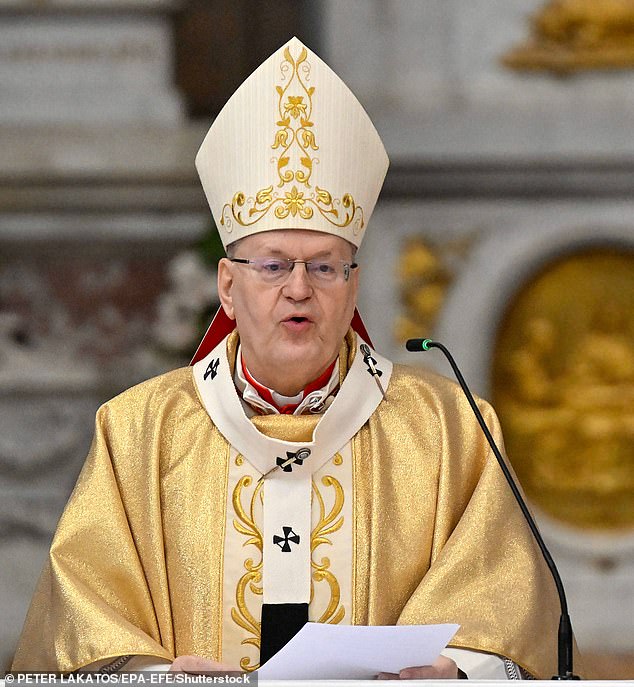
From the Eastern bloc, Erdo is a deep conservative and has spoken against divorced or remarried Catholics receiving holy communion
The Archbishop of Esztergom-Budapest would be the second Pope, after John Paul II, to have administered in the former Soviet bloc, when church leaders were often persecuted.
He campaigned for his predecessor Jozsef Minszenty to be exonerated after being arrested for opposing Hungary‘s communist regime.
Erdo is a deep conservative who has spoken against divorced or remarried Catholics receiving holy communion.
He went as far as suggesting that Catholics who remarry should be banned from Communion unless they agree to never have sex.
The hardline approach appeared to fly in the face of Pope Francis’s softer take on divorce.
While upholding the church’s teaching on marriage, the late pontiff also sought a more merciful approach, insisting those remarried Catholics remained a full part of the church community.
Jose Tolentino, 59
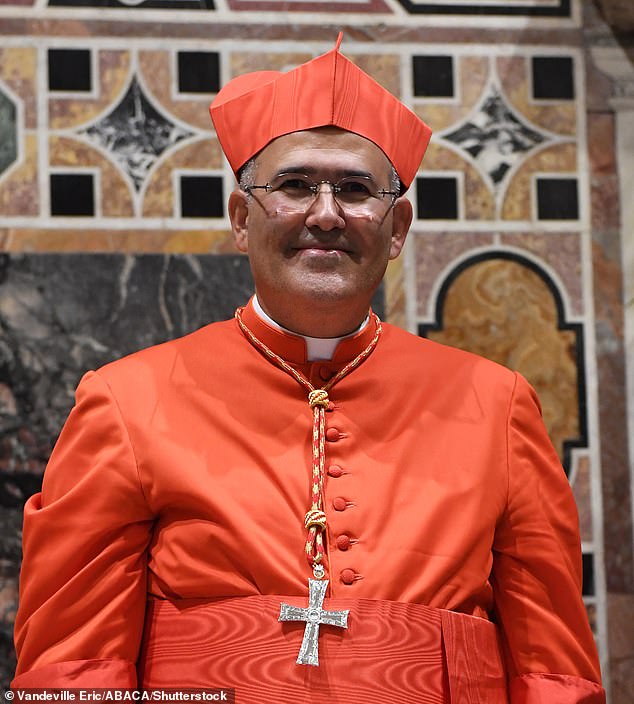
At 59, Tolentino is regarded as the ‘relative youth’ candidate and has held down several Vatican roles
Not to be confused with the US baseball player of the same name, and usually carries the suffix ‘de Mendonca’ to distinguish himself.
Hailing from Cristiano Ronaldo‘s birth place of Madeira, Portugal, he has served as an Archbishop as well as held down a number of Vatican roles.
As the – relative – youth candidate, he has advocated that biblical scholars engage with the modern world by watching films and listening to music.
In 2020, he insisted the church should not fear history as it opened its archives on its Second World War pontiff, Pope Pius XII.
It came amid a fears the wartime Pope turned a blind eye to those who were persecuted by Nazi Germany.
Tolentino said the opening of the Vatican’s files dating form 1939 to 1958 would prove Pius had been committed to saving Jews during the Holocaust.
‘The church has no reason to fear history,’ he said at the time.
Matteo Zuppi, 69
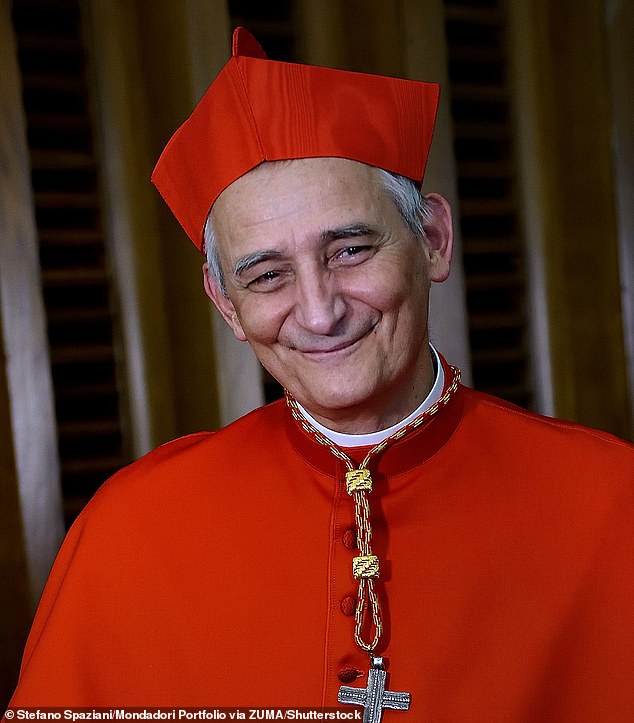
Zuppi was appointed cardinal by Pope Francis in 2019 and is the Vatican Peace Envoy to Ukraine
Zuppi has been Archbishop of Bologna since 2015 and was appointed a cardinal by Pope Francis in 2019.
Two years ago, the Pope made him the Vatican peace envoy for Ukraine, in which capacity he visited Moscow to ‘encourage gestures of humanity’.
While he didn’t have an audience with Putin, he did meet the president’s controversial ally Patriarch Kirill, the leader of the Russian Orthodox Church, but with little diplomatic progress to show for his efforts.
He was tipped as one of the late pontiff’s favourites.
However, he found himself in hot waters among more conservative Catholics after allowing a church blessing of a homosexual couple in his archdiocese.
Mario Grech, 68
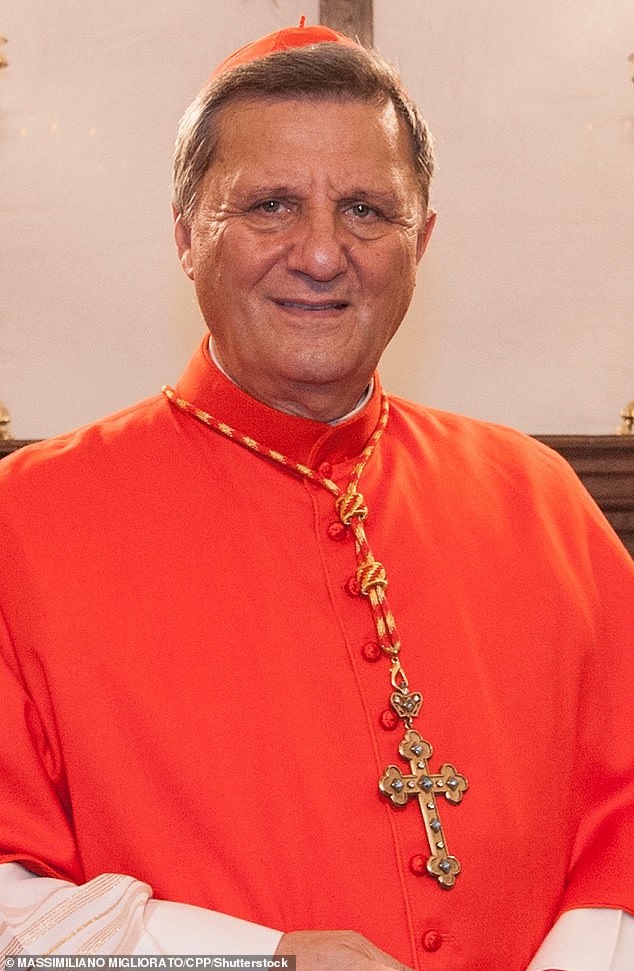
Cardinal Grech has played a key role in advancing Pope Francis’s vision for a more inclusive and participatory Church
Maltese Grech, and has previously served as the Bishop of Gozo and is now the Secretary General of the Synod of Bishops.
He has called for the church to ‘learn a new language’ when dealing with gay couples and divorcees, although is also seen as something of a traditionalist.
Robert Sarah, 79
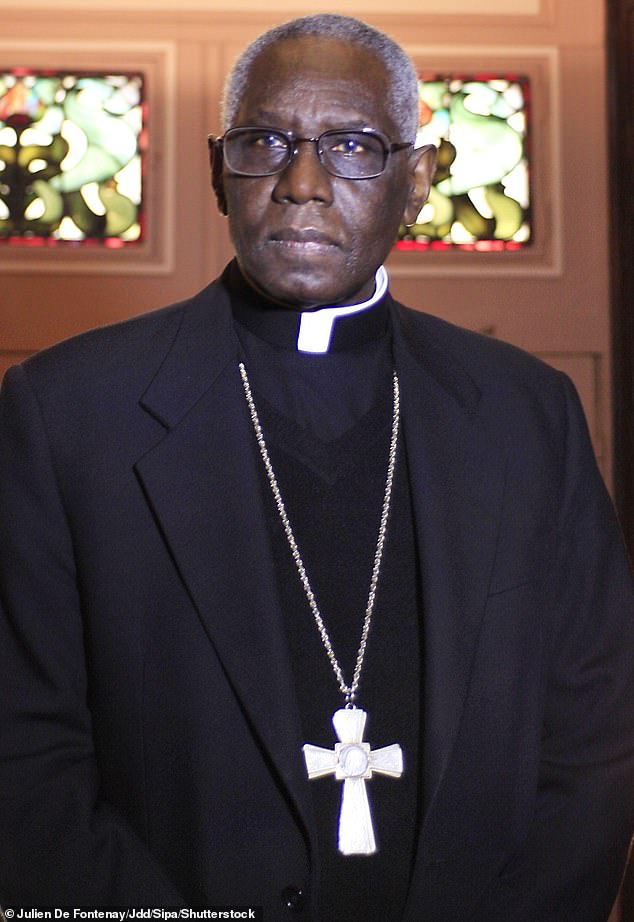
Conservative cardinal Sarah has denounced gender ideology as a threat to society
Born in French Guinea, Sarah is another possibility as the first black pope – although age is not on his side.
He has been working in Vatican positions since the time of John Paul II.
A conservative, he has denounced gender ideology as a threat to society.
He has also spoken out against Islamic fundamentalism.







